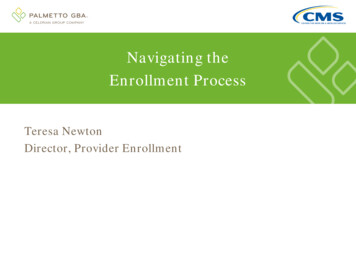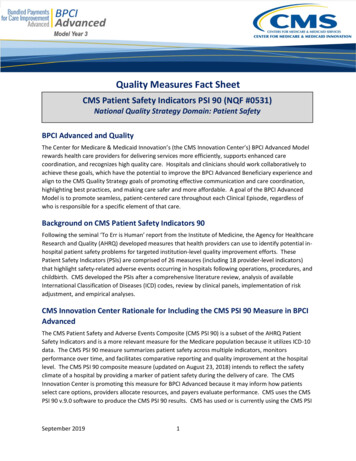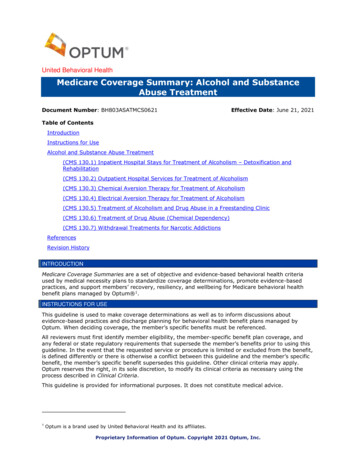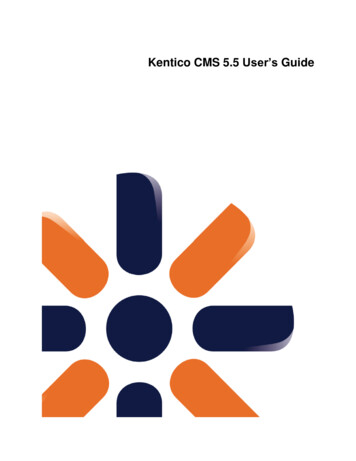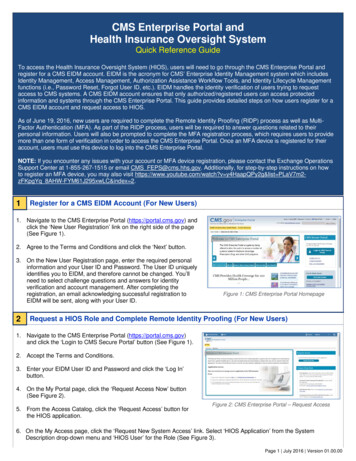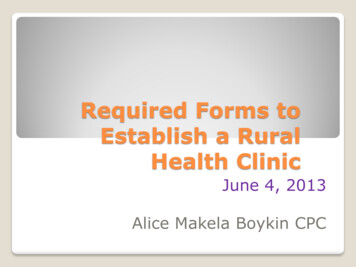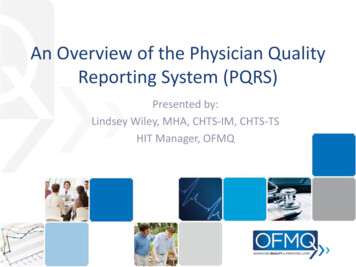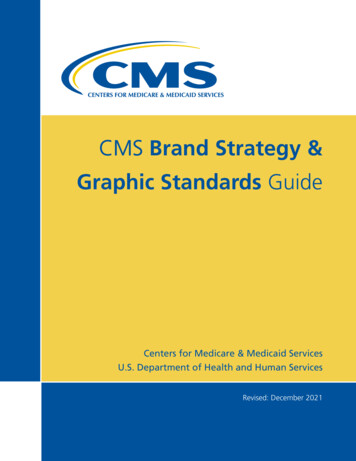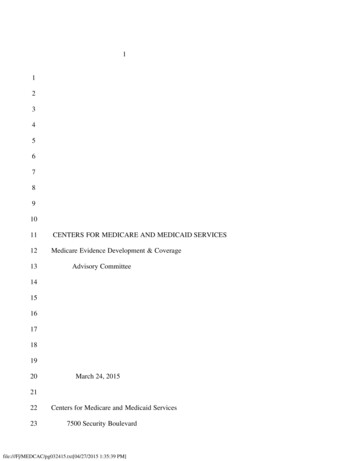
Transcription
11234567891011CENTERS FOR MEDICARE AND MEDICAID SERVICES12Medicare Evidence Development & Coverage13Advisory Committee14151617181920March 24, 2015212223Centers for Medicare and Medicaid Services7500 Security Boulevardfile:///F /MEDCAC/pg032415.txt[04/27/2015 1:35:39 PM]
24Baltimore, Maryland25212PanelistsActing ChairpersonI. Craig Henderson, MD34567Voting MembersHarry Burke, MD. PhDJosef E. Fischer, MDMark D. Grant, MD, PhDBeverly A. Guadagnolo, MD, MPHMitchell R. Kamrava, MDMarcel Salive, MD, MPHMaren T. Scheuner, MD, MPHDiana Zuckerman, PhD8910CMS LiaisonJames Rollins, MDIndustry RepresentativeLakshman Ramamurthy, PhD11121314Guest Panel MemberBarry M. Berger, MD, FCAPInvited Guest SpeakersBarbara Conley, MDJeffrey S. Ross, MD1516Executive SecretaryMaria Ellis171819202122file:///F /MEDCAC/pg032415.txt[04/27/2015 1:35:39 PM]
23242531TABLE OF CONTENTSPage23Opening RemarksMaria Ellis/James Rollins, MD/Craig Henderson, MD44Introduction of Panel956CMS Presentation and Presentation of VotingQuestionsCheryl Gilbreath, PharmD, MBA, RPh12789101112TA PresentationSreelatha Meleth, PhD19Invited Guest Speaker PresentationsBarbara Conley, MD38Jeffrey S. Ross, MD57Scheduled Public CommentsJan A. Nowak, MD, PhD, FCAPBas van der Baan88Robert Bilkovski, MD, MBA80941314Open Public Comments(No members of public signed up.)15Panel Questions to Presenters16Open Panel Deliberations and Voting16717Closing Remarks and Adjournment26918192021file:///F /MEDCAC/pg032415.txt[04/27/2015 1:35:39 PM]97
2223242541PANEL PROCEEDINGS2(The meeting was called to order at348:14 a.m., Tuesday, March 24, 2015.)MS. ELLIS: Good morning and welcome,5acting committee chairperson, members and6guests. I am Maria Ellis, the executive7secretary for the Medicare Evidence Development8and Coverage Advisory Committee, MEDCAC.9The committee is here today to discuss10selected molecular pathology tests for the11estimation of prognosis in common cancers,12adenocarcinoma of the colon and rectum, breast13cancer, invasive duct and lobular cancers,14non-small cell lung cancers.15The following announcement addresses16conflict of interest issues associated with17this meeting and is made part of the record.18The conflict of interest statutes prohibit19special government employees from participating20in matters that could affect their or theirfile:///F /MEDCAC/pg032415.txt[04/27/2015 1:35:39 PM]
21employer's financial interests. Each member22will be asked to disclose any financial23conflicts of interest during their24introduction. We ask in the interest of25fairness that all persons making statements or51presentations disclose if you or any member of2your immediate family owns stock or has another3formal financial interest in any company,4including an Internet or e -commerce5organization, that develops, manufactures,6distributes and/or markets consulting, evidence7reviews or analysis or other services related8to selected molecular pathology tests for9estimation of prognosis in common cancers,10adenocarcinoma of the colon and rectum, breast11cancer, invasive duct and lobular cancers,12non-small cell lung cancers. This includes13direct financial investment, consulting fees14and significant institutional support. If you15haven't already received a disclosure16statement, they are available on the table17outside of this room.1819We ask that all presenters pleaseadhere to their time limit. We have numerousfile:///F /MEDCAC/pg032415.txt[04/27/2015 1:35:39 PM]
20presenters to hear from today and a very tight21agenda, and therefore, cannot allow extra time.22The light will begin flashing -- I'm sorry - 23there is a timer at the podium that you should24follow. The light will begin flashing when25there are two minutes remaining and then turn61red when your time is up. Please note that2there is a chair for the next speaker and3please proceed to that chair when it is your4turn. We ask that all speakers addressing the5panel please speak directly into the mic and6state your name.7For the record, voting members present8for today's meeting are Dr. Harry Burke,9Dr. Josef Fischer, Dr. Mark Grant, Dr. Beverly10Guadagnolo, Dr. Mitchell Kamrava, Dr. Marcel11Salive, Dr. Maren Scheuner, and Dr. Diana12Zuckerman. A quorum is present and no one has13been recused because of conflicts of interest.14The entire panel, including nonvoting members,15will participate in the voting. The voting16results will be made available on our website17following the meeting. I ask that all panel18members please speak directly into the mic, andfile:///F /MEDCAC/pg032415.txt[04/27/2015 1:35:39 PM]
19you may have to move the mic since we have to20share.21The meeting is being webcast via CMS22Live in addition to being recorded for the23transcription. By your attendance, you are24giving consent to the use and distribution of25your name, likeliness and voice during the71meeting. You are also giving consent to the2use and distribution of any personal3identifiable information that you or others may4disclose about you during today's meeting.5Please do not disclose personal health6information.7In the spirit of the Federal Advisory8Committee Act and the Government in the9Sunshine Act, we ask that the advisory10committee members take care that their11conversation about the topic at hand take place12in the open forum of the meeting. We are aware13that members of the audience, including the14media, are anxious to speak with the panel15about those proceedings. However, CMS and the16committee will refrain from discussing the17details of this meeting with the media untilfile:///F /MEDCAC/pg032415.txt[04/27/2015 1:35:39 PM]
18its conclusion. Also, the committee is19reminded to please refrain from discussing the20meeting topic during breaks or lunch.21If you require a taxicab, there are22telephone numbers to local cab companies at the23desk outside of the auditorium.2425Please remember to discard your trashin the trash cans located outside of the room.81And lastly, all CMS guests attending2today's MEDCAC meeting are only permitted in3the following areas of CMS single site: The4main lobby, the auditorium, the lower level5lobby and the cafeteria. Any persons found in6any area other than those mentioned will be7asked to leave the conference and will not be8allowed back on CMS property again.9And now I would like to turn the1011meeting over to Dr. James Rollins.DR. ROLLINS: Good morning. My name12is Jim Rollins, I'm the director of the13Division of Items and Devices in the Coverage14and Analysis Group.1516Originally this MEDCAC was scheduledfor the spring of 2014. A technologyfile:///F /MEDCAC/pg032415.txt[04/27/2015 1:35:39 PM]
17assessment was performed that reflected the18medical literature at that time but because of19matters beyond our control, it was postponed.20In today's MEDCAC the technology assessment has21been updated to reflect the state-of-the-art22activities related to this topic.232425And now I will turn things over toDr. Henderson.DR. HENDERSON: So, I'm Craig91Henderson, from University of California2San Francisco, where I'm a professor of3medicine and a medical oncologist. I think the4first item should be to introduce other members5of the panel, let them introduce themselves,6and we will go from left to right here.7DR. BURKE: I'm Dr. Harry Burke, an8associate professor of medicine at the9Uniformed Services University of Health10Sciences. I am representing myself, my views11are not those of the university, Department of12Defense nor the U.S. Government, and I have no13conflicts of interest.14DR. HENDERSON: Okay, I just want to15remind each person, and you were very good, Ifile:///F /MEDCAC/pg032415.txt[04/27/2015 1:35:39 PM]
16have no conflicts of interest, and each one of17you should mention specifically your conflicts18of interest as you introduce yourself.19DR. FISCHER: I have no conflicts. I20am the McDermott professor of surgery at21Harvard Medical School.22DR. GRANT: I'm Mark Grant, I'm the23director of the Technology Assessment Center24for Clinical Effectiveness at Blue Cross Blue25Shield Association. I'm here representing101myself and have no financial conflict of2interest to report.3DR. GUADAGNOLO: I'm Ashley4Guadagnolo, I am an associate professor in the5division of radiation oncology at the6University of Texas M.D. Anderson Cancer7Center. I represent myself and I have no8conflicts of interest.9DR. KAMRAVA: I am Mitch Kamrava, a10radiation oncologist at UCLA. I represent11myself, with no conflicts of interest.12DR. SALIVE: Good morning, I'm Marcel13Salive, from the National Institute on Aging at14NIH, representing myself, and I have nofile:///F /MEDCAC/pg032415.txt[04/27/2015 1:35:39 PM]
1516conflicts of interest.DR. SCHEUNER: Hi, I'm Maren Scheuner,17I am chief of medical genetics at the VA18Los Angeles. I'm also a professor in the19department of Medicine at the David Geffen20School at UCLA, and I'm representing myself. I21have no conflicts of interest.22DR. ZUCKERMAN: Dr. Diana Zuckerman.23I'm the president of the National Center for24Health Research and I have stock in Johnson &25Johnson, which I have just been told may be1112related to some of these topics.DR. RAMAMURTHY: Lakshman Ramamurthy,3I'm a director at Avalere Health, which does4consult with a number of companies. I am5representing myself here and I have no6conflicts of interest. Thank you.7DR. BERGER: Good morning, I'm8Dr. Barry Berger, I'm the chief medical officer9at Exact Sciences Corporation. I am here10representing myself and I have no conflicts of11interest for the matters at hand.1213DR. HENDERSON: Thank you. So wewill, before we have our first presentation Ifile:///F /MEDCAC/pg032415.txt[04/27/2015 1:35:39 PM]
1415just want to make a couple points to emphasize.First of all, our discussion here is16not directed towards coverage decisions in any17way. Rather, we will focus on the questions18that are specifically addressed to the panel,19representing the questions that CMS has asked20us to address because of our individual and21collective expertise in these areas.22Secondly, I want to emphasize that we23are going to focus on just three tumor types.24In her opening remarks Maria emphasized those,25and they are lung cancer, colorectal cancer and121breast cancer. And we will be focusing2predominantly, or exclusively, on the markers3that are listed here and their prognostic4importance.5So with those opening remarks, I think6we will proceed, then, to the first7presentation, which will be by Cheryl Gilbreath8on the CMS presentation and voting questions.9Dr. Gilbreath.10DR. GILBREATH: Thank you and good11morning, ladies and gentlemen. My name is12Dr. Cheryl Gilbreath and I am the CMS analystfile:///F /MEDCAC/pg032415.txt[04/27/2015 1:35:39 PM]
13for this MEDCAC regarding molecular pathology14testing to estimate prognosis in cancer.15So, considering the evidence, today I16will briefly discuss some background17information regarding CMS's consideration of18evidence thus far and will introduce the19questions for this MEDCAC meeting.20CMS and genomic testing. Today's21MEDCAC meeting is one of a series of five22MEDCAC meetings over the last six years which23have focused on various topics related to24genomic testing. In 2009 we had genetic25genomic testing as well as screening genetic131tests, in 2010 we did pharmacogenomic testing2in cancer, 2013 we did genetic testing for3cancer diagnosis, and today we are working on4molecular diagnostic tests to estimate cancer5prognosis, so prognostic versus diagnostic.6A prognostic test is a laboratory or7imaging test to aid in the diagnosis or8detection of disease in a beneficiary with9signs or symptoms of an illness or injury. In10general a prognostic test, in contrast to a11diagnostic test, measures or detects one orfile:///F /MEDCAC/pg032415.txt[04/27/2015 1:35:39 PM]
12more markers called biomarkers that can affect13prognosis in a beneficiary with a personal14history of cancer.15For today's purposes, molecular16pathology testing to estimate prognosis in17cancer provides information about the18likelihood of recurrence after treatment, death19from cancer, or death due to another cause20after the diagnosis of a cancer.21What factors affect prognosis?22Several factors can affect prognosis and can be23used to inform physicians' decisions and to24advise patients about the likely courses of25their diseases. For example, cancer-related141factors include the type, stage and location of2the cancer, treatment-related factors include3the body's response to prior therapies, and4patient-related factors could include the5patient's overall health, comorbidities, as6well as the patient's personal values and7wishes regarding cure versus palliative care.8Prognostics reviewed. Tests for9genomic factors of cancer cells are being10actively investigated as estimators offile:///F /MEDCAC/pg032415.txt[04/27/2015 1:35:39 PM]
11prognosis. Some are designed to detect12recurrence at an early point of time. Others13offer views of cancer aggressiveness and may14alter the physician's management. The15molecular tests reviewed today estimate16prognosis in cancer types frequently17encountered in adult patients, colorectal,18breast and non-small cell lung cancers.19Genomic-based prognostic assessments of other20cancer types are currently under investigation.21The outcomes of interest for CMS.22Well, when CMS asks what effect do the results23of these tests have in patient outcomes, we are24especially interested in the outcomes shown25here, overall survival, mortality, avoidance of151harm of anticancer treatments, quality of life2and others.3So what is reasonable and necessary?4Well, CMS assesses the evidence to determine5whether it is adequate to conclude that the6item or device, or specifically in this case7the molecular test for cancer prognosis, leads8to improvement of clinically meaningful9outcomes in our beneficiaries. Today we willfile:///F /MEDCAC/pg032415.txt[04/27/2015 1:35:39 PM]
10be asking the MEDCAC panel to listen to the11presentations of the evidence and advise CMS on12how best to proceed.13So the MEDCAC questions, I will read14for you to keep under consideration during the15subsequent presentations: For the panel's16reference, a crosswalk is supplied to help17relate the MEDCAC voting questions and the TA18key questions which will be discussed after my19presentation.20Here is a voting question grid. The21MEDCAC panelists will vote on each prognostic22test per question. This is a sample of the23voting grid to identify your confidence level24or score for each question regarding each25prognostic test. If the mean average panel161score for a certain prognostic test is above22.5, then we will continue the voting questions3for that particular prognostic test. If the4mean score is below 2.5 then we will stop the5voting for that particular test. The TA to6MEDCAC crosswalk may be used as a reference7during your voting.8Other acronyms used. Well, we all arefile:///F /MEDCAC/pg032415.txt[04/27/2015 1:35:39 PM]
9aware of FDA, CDC, and there are quite a few10other acronyms which are going to be used11throughout the meeting. For your reference12we've also supplied a working glossary of13several of these other terms that will also be14used during the meeting. For example, test15validity measures, today's voting questions16will focus on analytic validity, which is a17test's ability to measure the genetic trait of18interest; clinical validity, the test's ability19to identify or predict the disease or condition20of interest; and clinical utility, which is the21balance of benefits and harms when the test is22used to influence patient management. This23information is also available in more detail in24the reference glossary that was provided.25On to the questions. MEDCAC question1711(a). For each prognostic test listed, how2confident are you that existing evidence is3sufficient to confirm the analytical validity4of the molecular pathology test to estimate5prognosis for Medicare beneficiaries with that6cancer type?7Again, if the answer for question 1(a)file:///F /MEDCAC/pg032415.txt[04/27/2015 1:35:39 PM]
8is at least in the intermediate range, a mean9score of 2.5 or more, then we will move on to10question 1(b). If not, we will save that11particular test for the discussion question12number 4.13Question 1(b). For each prognostic14test listed, how confident are you that15existing evidence is sufficient to confirm the16clinical validity of the molecular pathology17test to estimate prognosis in Medicare18beneficiaries with that cancer type?19As mentioned before, if the mean score20is 2.5 or above, we will move on to question 221for that particular prognostic test.22Number 2. How confident are you that23there is sufficient evidence to conclude that24using the molecular pathology test to estimate25prognosis affects health outcomes, including181benefits or harms, for Medicare beneficiaries2with cancer whose anticancer treatment strategy3is guided by the test's results? If the range4is above 2.5, we move on to question 3. If5not, we skip to question 4.6Voting question 3. How confident arefile:///F /MEDCAC/pg032415.txt[04/27/2015 1:35:39 PM]
7you that there is sufficient evidence to8conclude that using the molecular pathology9test to estimate prognosis has clinical10utility, meaning that it improves health11outcomes either due to increased benefits12and/or reduced harms for Medicare beneficiaries13with cancer whose anticancer treatment strategy14is guided by this test's result? Again, you15vote, and if the mean score is 2.5 and above,16that's great, because we're going to move on to17question number 4, the discussion question.18The discussion question: Please19discuss whether the following factors change20generalizability of evidence about molecular21diagnostic tests estimating cancer prognosis.22(A), regulatory status of the test, i.e., FDA,23or approved/cleared by the FDA versus LDT; (b),24performing laboratory type, i.e., academic25medical center laboratories, independent191commercial laboratories or other; (c),2demographic subgroups within the Medicare3beneficiary population; and (d), cancer genomic4characteristics.5This is the conclusion of myfile:///F /MEDCAC/pg032415.txt[04/27/2015 1:35:39 PM]
6presentation. I will invite Sreelatha Meleth7to give the TA presentation. Thank you.8DR. MELETH: Good morning. My name is9Sreelatha Meleth, I am representing the RTI-UNC10EPC, evidence-based practice center, and we11conducted the technology assessment for the, to12look at the tests for the estimation of13prognosis of common cancers.14A lot of people helped us, this is a15fairly extensive review, and I just wanted to16start off by acknowledging that, also17acknowledging that the funding, was based18on the AHRQ contract, and none of the19investigators had any conflicts of interest.20For the actual technology assessment,21I understand that we've changed the focus of22the cancers a little bit, but the actual TA23looked at four cancers and we looked at 1124tests, and the objective was to conduct this25systematic review assessing the 11 molecular201pathology tests that might inform estimation2for prognosis. The overarching question was3whether there is direct evidence that the4addition of the results of the tests would givefile:///F /MEDCAC/pg032415.txt[04/27/2015 1:35:39 PM]
5you more information about the prognosis in6addition to the traditional prognostic markers7that are traditionally used, and would improve8clinical outcomes for adult patients.9So, the table there shows you the10tests that we looked at. For breast we looked11at MammaPrint and Oncotype Dx. For colorectal12cancer we looked at BRAF, KRAS, MSI, MLH1 and13Oncotype Dx. Then for the objective lung we14looked at EGFR, KRAS and ALK translocation, and15for bladder we also looked at UroVysion.16Just a brief background. It is17estimated that there will be approximately 1.6718million new cases of cancer in 2014. It's the19second leading cause of death in the United20States. However, the death rates in general21for cancers are declining. In the last five22years death rates decreased 1.8 percent a year23for men and 1.4 percent a year for wome n. The24declines are largely due to the declines in25death rates in the four major cancers. In the211last five years lung cancer death rates are2down 34 percent for men, nine percent for3women; 34 percent, 45 percent and 46 percentfile:///F /MEDCAC/pg032415.txt[04/27/2015 1:35:39 PM]
4respectively for breast, prostate and5colorectal cancer.6And part of this improvement in7survival can be attributed to advances in8molecular pathology, which has resulted in9better understanding of cancer subtypes and10development of treatments based on the11subtypes. For example, the identification of12the human epidermal growth factor 2 receptor13resulted in targeted therapies for breast14cancer. Advances in molecular pathology have15also helped identify tumor characteristics that16help predict prognosis for a patient in17addition to traditional markers such as stage18and differentiation.19We would like to, before we go into20the matter and results, clarify that the two,21questions 2 and 3 in MEDCAC, the questions that22were just presented, ask about the anticancer23treatment therapy being guided by these tests.24It's important to know that these genetic tests25were used in two different contexts. In one221the tests are used in a specific context of a2test and therapy combination where the test isfile:///F /MEDCAC/pg032415.txt[04/27/2015 1:35:39 PM]
3being used to predict response to that4particular therapy, so it's a way of looking at5the test with respect to a very specific6treatment.7In the second context these tests are8used to estimate a patient's prognosis and9physicians use this information in a variety of10ways, including informing choices from a11variety of different treatment options.12CMS requested this report to evaluate13the second context, not the first. Therefore,14studies that evaluate specific test/therapy15combinations were excluded from this review.16So, we'll just briefly go through the17methods. We started off with key questions18that were then refined through discussions19within, between the EPC, AHRQ and CMS,20developed an analytic framework, we searched21the databases, we looked, did a systematic22review of published evidence, summarized23evidence qualitatively and quantitatively, with24a meta-analysis when that was appropriate.25The methods used in the review were231based on the framework developed at the CDC,file:///F /MEDCAC/pg032415.txt[04/27/2015 1:35:39 PM]
2the Evaluation of Genomic Applications in3Practice and Prevention, EGAPP, by that working4group which was established in 2005 to develop5a systematic process for evidence-based6assessment that is specifically directed7towards, focused on genetic tests and other8applications of genomic technology.9The methods developed and recommended10by this working group share many elements with11other existing processes, such as the USPSTF12and the AHRQ Evidence-Based Practice Center.13It also recognizes that the gold standard for14direct evidence, randomized clinical trials,15may not be available in the evidence base for16these new tests, and outlines the process for17building a chain of evidence.18And that chain of evidence is also19called the ACCE model, or the A-C-C-E, which20stands for the analytical validity, clinical21validity, clinical utility and, where22applicable, ethical, legal and social23implications, so those are the sort of pillars24that we use to build the evidence.25Analytic validity is the technical24file:///F /MEDCAC/pg032415.txt[04/27/2015 1:35:39 PM]
1performance of the test, so does the test2actually measure what it's supposed to. The3common ways in which we assess that are4sensitivity and specificity.5Clinical validity is looking at the6strength of the association between a genotype7and a result of interest. The strength of this8association determines the test's validity to9diagnose a disorder, assess susceptibility or10risk, or provide information on prognosis or11variation in drug response.12Clinical utility looks at the evidence13that the test results can actually change a14patient's management decisions and improve net15health outcomes down the road.16So, how did we apply the ACCE model?17So based on the working group's recommendation18we first developed an overarching question that19sought to find direct evidence addressing our20primary question. And then we created a set of21sub-questions based on the ACCE model that22would help build the chain of evidence that23could help answer the overarching question24indirectly.25So what was the overarching question?25file:///F /MEDCAC/pg032415.txt[04/27/2015 1:35:39 PM]
1The overarching question was, is there direct2evidence that the addition of the specified3molecular pathology tests used alone or in4combination with traditional prognostic factors5changes physician decision-making and improves6outcomes for adult patients with colorectal7cancer, breast, lung or bladder cancer,8compared with the use of traditional factors to9predict risk of recurrence for adults with10these cancers? Ideally we hoped to find11published evidence that directly answered this12key question.13In the absence of direct evidence, in14the event that there would be an absence of15direct evidence for the key question one, we16developed key questions to build a chain of17evidence that would help answer KQ1, and the18chain again was based on the ACCE model. So19the analytic validity question was, does the20existing evidence establish technical accuracy21and reliability of these tests for detecting22the relevant molecule analytes? The clinical23validity question was, does existing evidence24establish the prognostic accuracy of the test25for predicting recurrence? And clinicalfile:///F /MEDCAC/pg032415.txt[04/27/2015 1:35:39 PM]
261utility was, does existing evidence support2clinical utility of the molecular pathology3tests?4Clinical utility was further refined5into the impact on physician decision-making6and patient centered harm.78I have the red light flashing, is thatactually right? Okay.9What is the evidence that prognostic10information, the first question for clinical11utility was, is there evidence that the12prognostic information provided by these tests13modifies physician decisions regarding use of14adjuvant antineoplastic chemo and/or15radiotherapy, enhanced diagnostic testing for16recurrence, and/or surgery among adult patients17with malignant tumors?18And the KQ4b was, what is the evidence19that modified decisions leads to improved20outcomes, including patient-centered outcomes21such as improved quality of life, reduced22disease recurrence, increased overall survival23or disease-free survival, or reduced24therapeutic side effects?25And KQ5 looked at the harms associatedfile:///F /MEDCAC/pg032415.txt[04/27/2015 1:35:39 PM]
271with treatment decisions informed by the2molecular pathology tests.3So based on that, we created an4analytic framework where, we are looking at5those, so that's how we expected to come to6our conclusion, to assess our evidence and go7throught the results. So we have the cancer,8we have the tests, and then you're looking at9whether the test is actually doing a good, you10know, detecting what they wanted to detect, and11then we're looking at whether it actually predicted12risk of recurrence of prognosis, and then looked13at treatment decisions, and then looked at health14outcomes for the patients, and also whether patients15were harmed.16We searched PubMed, the Cochrane17Library and EMBASE for English-language studies18published through November 2013. We also19searched the reference list of pertinent review20articles and studies that met our inclusion21criteria. We searched as well for unpublished22studies relevant to this review, for which we23used relevant websites, clinicaltrials.gov, the24FDA website, Health Services Research Projectsfile:///F /MEDCAC/pg032415.txt[04/27/2015 1:35:39 PM]
25in Progress, and the European Union Clinical281Trials Register. We also requested information2from the College of American Pathologists and3from relevant companies, asking for data that4they believe should be considered for the5review.6A very brief look at the population7and intervention, so the population includes8adult patients with one of the cancer types of9interest that evaluated an eligible test. The10comparators for KQ1, 4 and 5 included studies11that compare at least one of the tests plus12standard prognostic factors with the standard13prognostic factors alone to determine whether14the test adds independent prognostic value or15benefit, or introduces additional harms.16We did not include studies focused on17patients with advanced or metastatic cancer or18studies focused on predicting response to19treatments. And just in case there's a20question, because the task of the technology21assessment was focused on risk of recurrence,22so it didn't seem relevant to look at advanced23metastatic cancers, and we already talked aboutfile:///F /MEDCAC/pg032415.txt[04/27/2015 1:35:39 PM]
2425response to treatments.The comparators for KQ2, which is the291analytic validity question, we included studies2of test performance, including intra/inter -lab3reproducibility for the included tests. For4KQ3, which is clinical validity, we included5studies comparing patients with different test6results, example, those with a mutation versus7those who are wild-type, to establish8prognostic value, with a multivariate analysis9to adjust for known factors. We required that10the results were either adjusted for known11factor using a model, or were specifically12addressed in other ways which could be either13the inclusion/exclusion criteria for the study14or something like stratification.15So, all studies, for everything we had16independent dual review to assess for17eli
21 been updated to reflect the state-of-the-art 22 activities related to this topic. 23 And now I will turn things over to 24 Dr. Henderson. 25 DR. HENDERSON: So, I'm Craig 9. 1 : Henderson, from University of California; 2 : . from the National Institute on Aging at: 14 . NIH, representing myself, and I have no : file:///F /MEDCAC/pg032415 .

